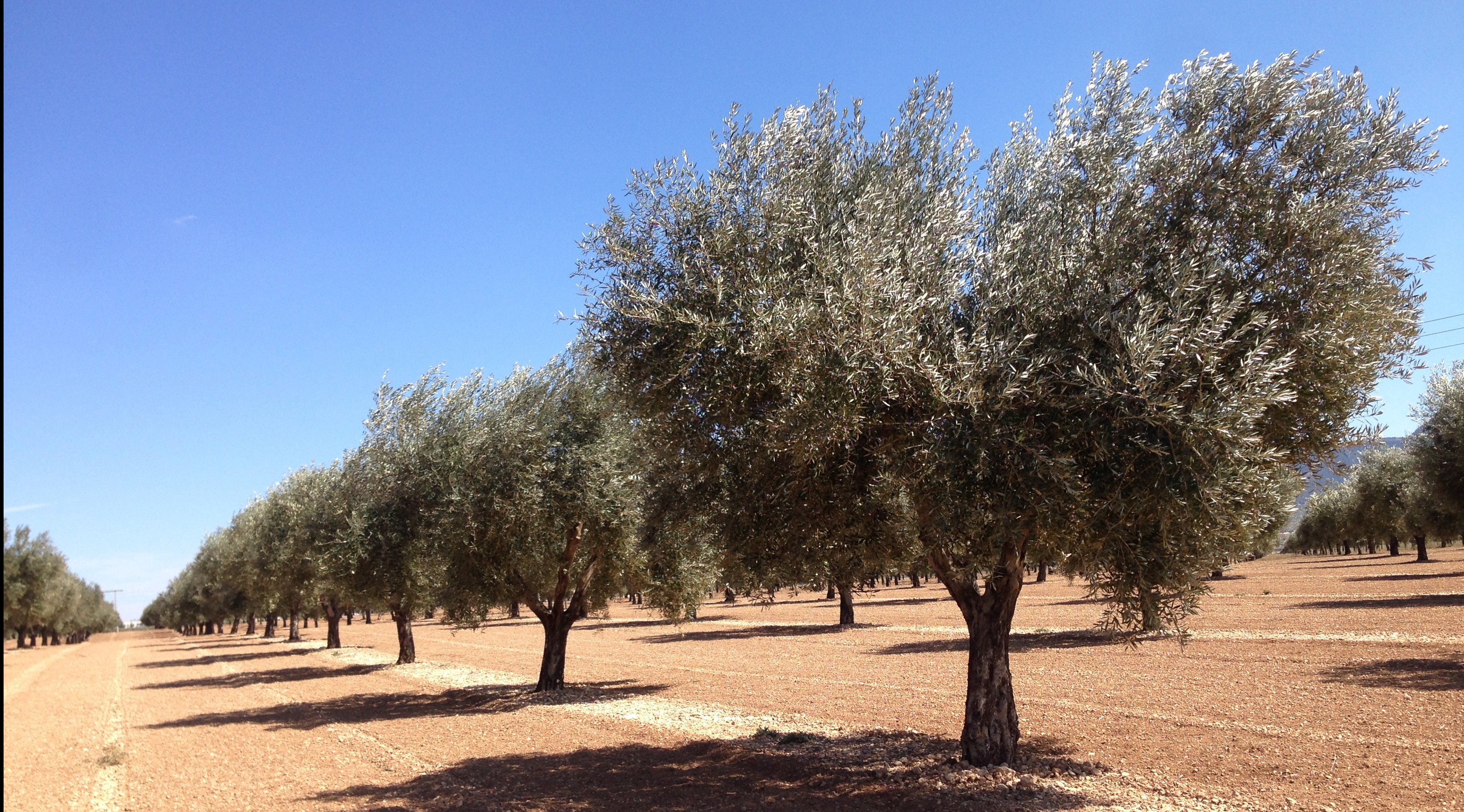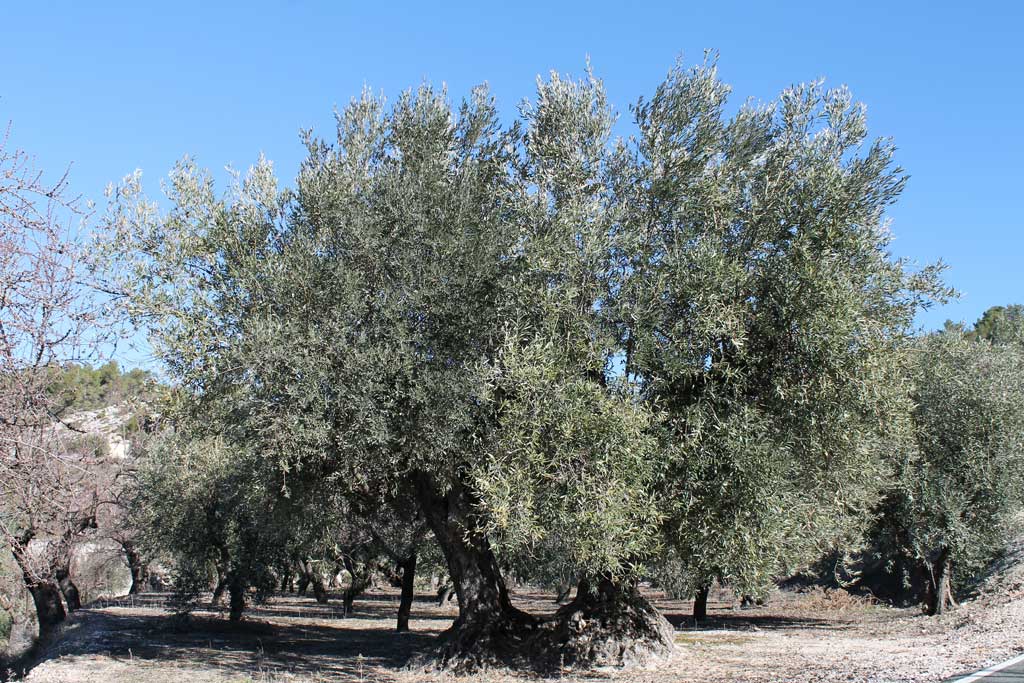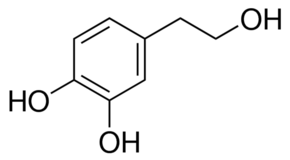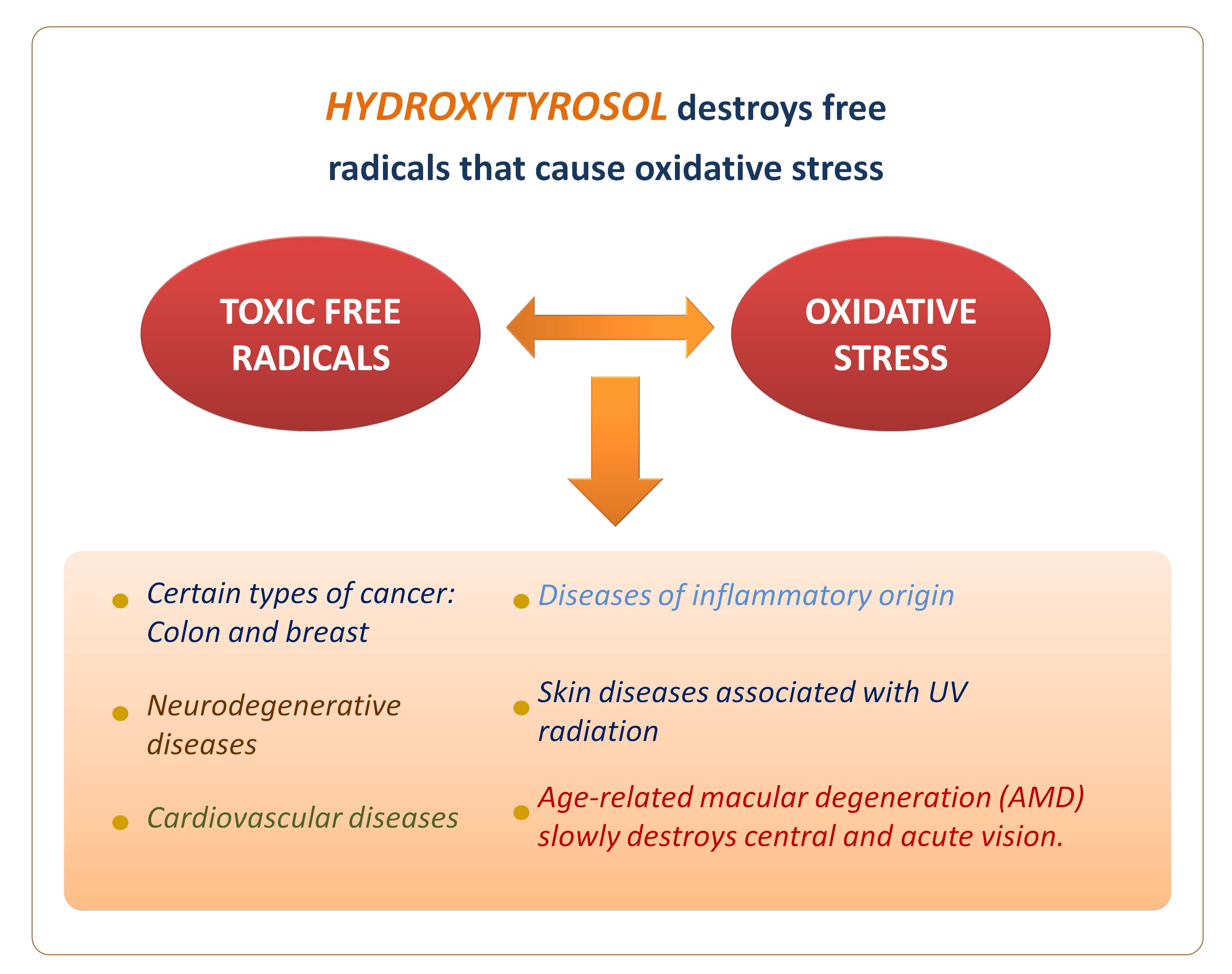
Properties and benefits of the Hydroxytyrosol from olive trees
Hydroxytyrosol is the main antioxidant of virgin olive oil and, therefore, a potent free radical scavenger. As free radicals are the precursors of many health problems, numerous scientific studies have shown that the consumption of olive polyphenols, and especially Hydroxytyrosol (HTY), promotes positive health effects.
In order to understand the scope of Hydroxytyrosol, first we have to explain what antioxidants and free radicals are.
Free radicals are very reactive chemical species, and harmful to the body, when they are in a situation of imbalance, that is, when their number increases what our body is able to eliminate with its endogenous antioxidants.
An excess of oxidants against antioxidants causes the appearance of oxidative stress and cellular damage, a situation that is aggravated under certain circumstances such as intense physical exercise, stress, pollution, smoking, alcoholism, poor nutrition and exposure to solar radiation. Many of the most common human diseases are the result of the action of free radicals against cells, proteins, etc.
Antioxidants, in turn, are compounds that inhibit or retard the oxidation of certain molecules, preventing the initiation or propagation of oxidative reactions in chain caused by free radicals. As consequence, the contribution of antioxidants to the body is fundamental to protect cells against oxidative stress.
Polyphenols, source of antioxidants:
Experimental evidence from human and animal studies (both in vivo and in vitro) shows that Hydroxytyrosol and other phenolic compounds of olive oil have antioxidant biological activities.
Hydroxytyrosol, in particular, is a highly bioavailable phytochemical with a high antioxidant capacity, responsible for most of the benefits of olive polyphenols in health.
According to plenty of scientific studies around the world, the main properties attributed are:
- Prevention of cardiovascular diseases (CVD). The cardioprotective capacity of Hydroxytyrosol is endorsed by the EFSA with a health claim for its inhibitory activity on the oxidation of LDL lipoproteins, which leads to diseases such as atherosclerosis. HT also inhibits platelet aggregation that occurs in thrombosis, and protects from cell death induced by reactive oxygen intermediates (as it happens in situations of ischemia).
- Anti-inflammatory. HTY has been shown to inhibit the production of pro-inflammatory compounds caused by human leukocytes such as leukotrienes.
- Anti-aging. The antioxidant capacity of Hydroxytyrosol is superior to other antioxidants such as vitamin C and E. It plays an important role in delaying cellular aging processes as blocking the appearance of external signs such as wrinkles, sagging and spots. And due to the fact that HTY contains lipophilic and hydrophilic properties, Hydroxytyrosol turns to be a molecule very suitable for cosmetic use.
- Antimicrobial. Because it has potent antimicrobial properties against different types of bacteria, viruses and fungi.
- Anticancer. For its chemopreventive properties (try to reduce the risk, delay the cancer or prevent it from returning). This is because HT is able to inhibit the initiation and promotion phases of carcinogenesis. This prevents DNA damage induced by different genotoxic species and induces cell death in different tumor lines, such as breast and colon cancer.
- Protection against UV radiation. Hydroxytyrosol is able to prevent damage on melanoma cells when humans are exposed to harmful UV radiation. This is because HT reduces, significantly, the breakdown of DNA strands caused by UVB radiation. The reason is the capacity of this molecule to inhibit the proliferation of reactive species caused by incident radiation.
- Prevention of neurodegenerative diseases. Several studies suggest that reactive oxygen species (ROS) are involved in the etiology of a number of degenerative diseases such as cardiovascular, diabetes, cancer or Alzheimer’s. In this case, Hydroxytyrosol exerts an antioxidant protection against the oxidative damage induced by several types of reactive species of oxygen and nitrogen in the nervous tissue.
- Protection against ARMD (age-related macular degeneration). This is a disease related to age and other harmful effects such as smoking, which causes blindness in people over 55 years. Hydroxytyrosol properties such as antioxidant, anti-inflammatory and protection of the pigment epithelium, minimize the appearance and development of this disease.
To sum up:
You can expand the information about polyphenols and Hydroxytyrosol in Nutexa Blog.
If you want to know the properties of the products with Hydroxytyrosol that we manufacture in NUTEXA contact us through this link.
REFERENCES
- Deiana M, Incani A, Rosa A, Atzeri A, Loru D, Cabboi B, Paola Melis M, Lucas R, Morales JC, Assunta Dessì M. Hydroxytyrosol glucuronides protect renal tubular epithelial cells against H(2)O(2) induced oxidative damage. Chem Biol Interact. 2011 Sep 30; 193(3):232-9
- Bullon P, Quiles JL, Morillo JM, Rubini C, Goteri G, Granados-Principal S, Battino M, Ramirez-Tortosa M. Gingival vascular damage in atherosclerotic rabbits: hydroxytyrosol and squalene benefits. Food Chem Toxicol. 2009 Sep.; 47(9):2327-31.
- Carluccio, M. A., Siculella, L., Ancora, M. A., Massaro, M.et al., Olive oil and red wine antioxidant polyphenols inhibit endothelial activation: antiatherogenic properties of Mediterranean diet phytochemicals. Arterioscler Thromb.Vasc. Biol. 2003, 23, 622–629
- Castañer O, Covas MI, Khymenets O, Nyyssonen K, Konstantinidou V, Zunft HF, de la Torre R, Muñoz-Aguayo D, Vila J, Fitó M. Protection of LDL from oxidation by olive oil polyphenols is associated with a downregulation of CD40-ligand expression and its downstream products in vivo in humans. American Journal of Clin Nutr. 2012 May; 95(5):1238-44.
- Elisa Tripoli et al. The phenolic compounds of olive oil: structure, biological activity and beneficial effects on human health. Nutr Res Rev 2005;18:98-112.
- Li J, Yang G, Wang S, Jiang L, Liu X, Geng C, Zhong L, Chen M. The protective effects of hydroxytyrosol against ortho-phenylphenol-induced DNA damage in HepG2 cells. Toxicol Mech Methods. 2012.
- Felipe Alconchel-Gago1, Abel Santamaría, Isaac Túnez. Antioxidant effect of oleic acid and hydroxytyrosol in an experimental model similar to Huntington’s disease. Med. 2014; 99: (792): 60-64
- Friedman M, Rasooly R, Do PM, Henika PR. The Olive Compound 4-Hydroxytyrosol Inactivates Staphylococcus aureus Bacteria and Staphylococcal Enterotoxin A (SEA). J Food Sci. 2011 Oct; 76(8):M558-63.
- Maria C. et al. Hydroxytyrosol, a phenolic compound from virgin olive oil, prevents macrophage activation. Naunyn-Schmied Arch Pharmacol. 2005;371:457-465.
- Maiuri MC, De Stefano D, Di Meglio P, Irace C, Savarese M, Sacchi R, Cinelli MP, Carnuccio R. Hydroxytyrosol, a phenolic compound from virgin olive oil, prevents macrophage activation. Naunyn Schmiedebergs Arch Pharmacol. 2005 Jun; 371(6):457-65
- Raederstorff, D., Antioxidant activity of olive polyphenols in humans: a review. Int. J. Vitam Nutr. Res. 2009, 79, 152– 165.
- Zhongo Liu, et al. Hydroxytyrosol protects retinal pigment epithelial cells from acrolein-induced oxidative stress and mitochondrial dysfunction. J. Neurochem. 2007;103:2690-2700.
- Xiaomei Zhang et al. Hydroxytyrosol inhibits pro-inflammatory cytokines, iNOS, and COX-2 expression in human monocytic cells. Naunyn-Schmied Arch Pharmacol. 2009;379:581-586.






